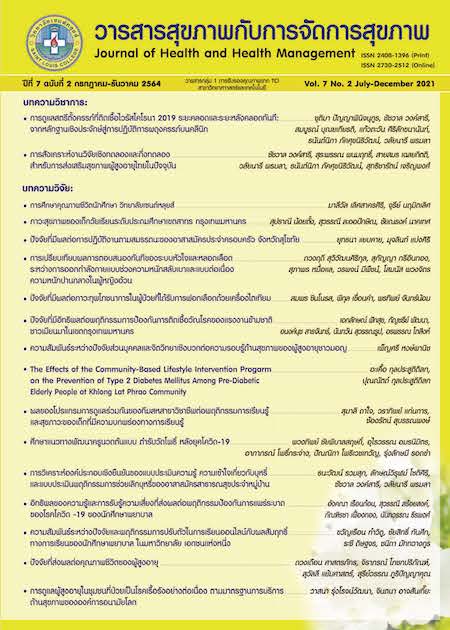Relationship between Personal Factors and Positive Psychology on Health Literacy among the Elderly People of the Mon Tribe in Thailand
Keywords:
personal factors, positive psychology, Health Literacy, Mon elderlyAbstract
This study is basically a survey that aims at determining the relationship between personal factors, positive psychology and health literacy among the elderly Mon people of Thailand. This survey was participated by 232 respondents who were chosen based on the Simple Random Sampling without Replacement Method. Data were collected by distributing a questionnaire (to determine personal factors such as: gender, marital status, occupation, monthly income, and existing disease); Positive Psychology Questionnaire (to determine how positive the respondents are in terms of their psychology); and Health Literacy Questionnaire (determine the level of health literacy of the research participants). The reliability of the last two instruments were at 0.86 and 0.89, respectively. The relationships of the variables were analyzed using the Pearson Product Moment Correlation and Chi-square.
The research results show that the mean scores of the respondents’ health literacy and positive psychology are at a high level ( r= 3.70, 3.96, and SD = .33, .37, respectively). Results also show that while personal factors appear to have no significant relationship to the participants’ health literacy, computation between positive psychology and health literacy however shows otherwise. In fact, correlating the data on the said variables appear to be statistically significant at 0.05 level as r registers at 0.45 (p < .05). These results suggest that to develop health literacy among the Mon elderly, it may be sensible to start by promoting positive psychology among them.
References
ชัชวาล วงค์สารี. (2561). สถานการณ์ของผู้สูงอายุที่มีภาวะสมองเสื่อมในประเทศไทย: ประเด็นและแนวโน้มการดูแลทางการพยาบาล. วารสารวิชาการมหาวิทยาลัยอีสเทิร์นเอเชีย ฉบับวิทยาศาสตร์และเทคโนโลยี, 12(1), 47-58.
สุวรรณา สุวรรณผล, และวลัยนารี พรมลา. (2559). พฤติกรรมการดูแลสุขภาพ และการสนับสนุนทางสังคมต่อคุณภาพชีวิตของผู้สูงอายุชาวมอญ จังหวัดปทุมธานี. วารสารสถาบันเทคโนโลยีแห่งสุวรรณภูมิ, 3(2), 67-78
ประไพพิศ สิงหเสม, พอเพ็ญ ไกรนรา, และวรารัตน์ ทิพย์รัตน์. (2562). ความสัมพันธ์ระหว่างความรอบรู้ด้านสุขภาพกับพฤติกรรมสุขภาพตาม 3อ.2ส. ของผู้สูงอายุ ตำบลหนองตรุด จังหวัดตรัง. วารสารวิทยาลัยพยาบาลบรมราชชนนี อุตรดิตถ์, 11(1), 37 – 51.
เยาวลักษณ์ มีบุญมาก, จิริยา อินทนา1, กรรณิการ์ กิจนพเกียรติ, เพ็ญจมาศ คำธนะ, และนงณภัทร รุ่งเนย. (2562). ความรอบรู้ด้านสุขภาพของผู้สูงอายุในชุมชนกึ่งเมืองแห่งหนึ่งในจังหวัดราชรี. วารสารเครือข่ายวิทยาลัยพยาบาลและการสาธารณสุขภาคใต้, 6(ฉบับพิแศษ), 129-144.
Compton, W. C., & Hoffman, E. (2019). Positive psychology: The science of happiness and flourishing. Sage Publications.
Intarakamhang, U., & Macaskill, A. (2018). Multi-group Causal Model of Health Literacy and Behaviors on Family Wellbeing among Thai Adults at Risk of Non-Communicable Diseases (NCDs). Journal of research in health sciences, 18(4), e00429.
Kaphingst, K. A., Goodman, M. S., MacMillan, W. D., Carpenter, C. R., & Griffey, R. T. (2014). Effect of cognitive dysfunction on the relationship between age and health literacy. Patient education and counseling, 95(2), 218-225.
Krejcie, R. V., & Morgan, D. W. (1970). Determining sample size for research activities. Educational and psychological measurement, 30(3), 607-610.
Gupta, K. K., Attri, J. P., Singh, A., Kaur, H., and Kaur,G. (2016). Basic concepts for sample size calculation: critical step for any clinical trials!. Saudi J Anaesth, 10(3), 328-331.
Liu, C., Wang, D., Liu, C., Jiang, J., Wang, X., Chen, H., ... & Zhang, X. (2020). What is the meaning of health literacy? A systematic review and qualitative synthesis. Family medicine and community health, 8(2), e000351.
Nutbeam, D. (2008) . The evolving concept of health literacy. Social Science & Medicine, 67(12), 72-78.
Osborne, S. P., Radnor, Z., & Nasi, G. (2013) . A new theory for public service management? Toward a (public) service-dominant approach. The American Review of Public Administration, 43(2), 135-158.
Palumbo, R .(2017). Examining the impacts of health literacy on healthcare costs. An evidence synthesis. Health Service Management Research, 30(4), 197-212.
Renani, M. T. S., Nourafkan, F., Fathimard, F., & Mazarei, R. (2020) . Relationship between Self-efficacy and mental health with health literacy in patients with diabetes in kazerun city, fars, Iran. Journal of Community Health Research, 9(4), 256-264.
Word Health Organization. (1998). Improving health literacy. [Online] Retrieved 3 November, 2021, from https://www.who.int/activities/improving-health-literacy
Sak, G., Rothenfluh, F., & Schulz, P. J. (2017) . Assessing the predictive power of psychological empowerment and health literacy for older patients’ participation in health care: a cross-sectional population -based study. BMC geriatrics, 17(1), 1-15.
Tiller, D., Herzog, B., Kluttig, A., & Haerting, J. (2015). Health literacy in an urban elderly East-German population–results from the population-based CARLA study. BMC public health, 15(1), 1-9.
Vogt D, Schaeffer D and Berens E-M .(2019). Health literacy in later phases of life: findings from Germany and other countries. In Okan O, Bauer U, Levin-Zamir D, Pinheiro P and Sørensen K (eds), International Handbook of Health Literacy: Research, Practice and Policy Across the Lifespan. Bristol,UK: Policy Press.
Yang, B. X., Xia, L., Huang, R., Chen, P., Luo, D., Liu, Q., ... & Wang, X. Q. (2021) . Relationship between eHealth literacy and psychological status during COVID-19 pandemic: A survey of Chinese residents. Journal of nursing management, 29(4), 805-812.
Yokokawa, H., Yuasa, M., Sanada, H., Hisaoka, T., & Fukuda, H. (2015) . Age-and sex-specific impact of health literacy on healthy lifestyle characteristics among Japanese residents in a rural community. Health, 7(06), 679.
Zugich, J.N., Goldman, D.P., Cohen, P.R., Cortese, D., Fontana, L., Kennedy,B.K. & Fain,M.J. (2016) . Preparing for an aging world: Engaging biogerontologists, geriatricians, and the society. The Journals of Gerontology: Series A, 71(4), 435–444.
Downloads
Published
How to Cite
Issue
Section
License
Copyright (c) 2021 Journal of health and health management

This work is licensed under a Creative Commons Attribution-NonCommercial-NoDerivatives 4.0 International License.




